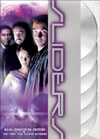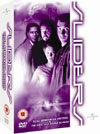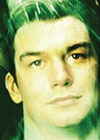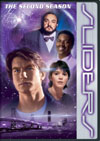This story taps into some archetypal human struggles to get the audience invested in its main characters, before launching into one sci-fi twist after another to lend some fascinating perspectives and philosophies on the situation. Although some of the dialogue dredges up similar dynamics to the anti-choice time travel conundrums often plaguing 20th century sci-fi, the devices used in this story force one to dig deeper and think more extensively about the dynamics in play, and it becomes something truly unique in the annals of science fiction. I'm impressed, and I think I like it a lot in spite of its few glaring shortcomings.
"...Reminds me of Vancouver."The portions in Nueva España world are full of a lot of tongue in cheek in-jokes, some of which unintentionally magnify in retrospect. First, there are the Canadian connections. All the complaining about San Francisco weather is in a way masking the fact that what cast & crew REALLY want to do is complain about the weather in Vancouver, B.C., Canada, which is equally if not more cold & wet. (This is more of a west coast thing than a Canadian thing, especially the wet part.) And they have had far wetter and darker conditions to deal with during season two's shoot than the much brighter conditions seen in season one.I can assure you that we Canadians listen to a vastly wider variety of music than our most clichéd exports Anne Murray and Gordon Lightfoot, who are good but don't really register on my list of favourite or repeat-listening music. Come on, Rembrandt, get with it. Of course the supporting cast and half the crew are Canadian themselves, with "Sliders" being Jerry O'Connell's second major TV series shot in Canada after Toronto's "My Secret Identity", so you have to assume that they're poking fun at themselves with half of this stuff. This also seems to be the perfect story segment to vent such complaints, considering that the main twist here is to swap ethnic roles within what used to be U.S. territories, while Canada and its border take on the stereotypical role more often associated with Mexico. All "Sliders" stories so far have pretty much taken place in present-day San Francisco up until this point, but finally it looks like a little cross-country trip is in order. But it's not quite so far flung, as later portions reveal. The second big in-joke is of course Charlie O'Connell's guest appearance in the cast. I can't help chuckling when he claims to be Daelin's brother, and Quinn says, "Oh yes, I remember you." firstly because the actor is in fact Jerry O'Connell's brother (so he definitely should remember him), but also because he will later go on to play Quinn's newly-discovered long lost brother in the fourth season. Yes, we remember him too! His appearance here is fun, and Charlie plays this role to good serious effect.
"This is so trippy! We keep getting involved with the same group of people."The action in the first segment is typically good "Sliders" stuff, but doesn't stand out too much other than in the expanded location that the story makes you think you're headed towards. The wormhole effect then enjoys a very effective introduction at this later stage. A lot of other "Sliders" stories feature similar events at their conclusion, and this now becomes a story of escalating proportions as it continues to look for greater resolution beyond the formulaically obvious.This second portion of the tale contains the emotional heart of the story, and as such, all its differences from our normal world are defined in terms of the different lives its central characters have led. No major sociological differences are defined for the world at large. Smart and refreshing. Interesting patterns and recurring themes begin to take shape here, having an extra weight now that they've been played out by the same people under different circumstances in very different parallel worlds. One of the best parts of this story's score is Stephen Graziano's underscore for the departure scene at the end of the second act, a nice complement to many of the livelier action cues used in other parts of the story.
Time's ArrowEven just having a third act on this subject would yield a good, powerful, high-ranking story within season two, but our creative writer Steve Brown doesn't stop there. In comes yet another idea so unique, I don't think any other sci-fi show has even attempted it before or since, and thankfully it is a really good match to what the rest of the story has been about. The theory explored here seems to want to prove that time is a scalar rather than a vector, and is just as likely to flow in reverse as it is forwards.Two caveats spring to mind instantly. If that was the case, one might expect half of the parallel universes we encounter on the show to be running in reverse, when clearly this is a huge rarity. Also, if this universe is running in reverse, it seems lucky that it reversed itself to 1996 just as all the other universes moved forward into 1996, and we're additionally lucky that the Sun and Earth are in a similar position in their orbits such that our sliders don't come out of their wormhole in outer space. Maybe there are good reasons why it should all work out so conveniently, but the script isn't giving those to us.
DiscontinuityOne of the most difficult concepts of this story is that of "discontinuity", which basically allows chunks of time to appear to be going in the same direction for our sliders and the rest of the world they are in, until a woozy visual effect dances before us and makes it look as though the Sliders have popped a bit back in time. This probably contributes to the reason why neither we nor the Sliders see themselves come out of the wormhole into this world.... although that still isn't explanation enough on its own. At least the Sliders question this, allowing one to go with it for the moment."Discontinuity" doesn't really make satisfying sense if one looks purely at physics alone. It seems to work better once the mind/brain and its functions of perception come into play. I'm reminded of the experiment in which, for days on end, people wore special glasses that made everything look upside down. After a while, their brains compensated for what they were seeing and they could perceive the world right side up again, walk around, pick objects up, etc., and basically function as normal again. (Check out "What the Bleep Do We Know" for the full story on that.) Perhaps something similar is happening here to the Sliders.... as their brains take a chunk of reversed time and play it forward in attempting to understand it, and then reach for the next chunk which chronologically belongs before it. Now it's somewhat more plausible. It's still not quite as neat or accessible to the audience as a similar disoriented memory effect that was achieved in the coolly bizarre film "Memento" with Joe Pantoliano and Carrie-Anne Moss. This story really has belonged to Quinn and two of the guest stars, focusing on them fairly well while also giving the other three Sliders just enough to do to remain decent. Highlighted are both Quinn's desires and his altruistic heroics, whilst the question brews up if he will have to sacrifice one to have the other, or if he can really have both at once. Yes, this is the same dynamic that really supercharged the Spiderman films. Earlier in the series, one might have expected Wade to weigh in on this a little more, but since her escapade in "Obsession" (story no. 19), not to mention her admissions in "In Dino Veritas" (story no. 17), it seems only fair that she gives him equal rope to explore the avenues that he does. Through his dialogue, the writer leans a little too heavily on the idea of pre-destined time-lines for my tastes, which all too often grate against heroics and common sense. Even here, there's absolutely no sensible reason why Quinn should declare himself guilty before the courts, or encourage his friends to do the same. The verdict in the court will neither help nor hinder them from moving "backwards" in this world's time and getting unhandcuffed and unarrested, and they honestly don't know what their involvement was / will be concerning the incident of the case. Quinn's heroics do fare a bit better during the conclusion of this story than in pretty much all previous stories with the exception of "The Good, the Bad, and the Wealthy" (story no. 16), and we have to thank in part his belief that his involvement with the locals is "predestined". But we can be even more thankful that Quinn doesn't accept the predestined outcome that they have been made aware of, and instead he searches for a way to make things better. Excellent!
Parallel vs. Branching UniversesThose of you who have been reading my reviews of time travel conundrums know how passionately I favour heroics over pre-destined outcomes, and how much I often claim that awareness of parallel universes such as the ones explored continuously on this show, are in fact the best cure for the kind of pre-destiny reverence that fuels heroic phobias. Technically, we shouldn't really call such universes "parallel" within my paradigm, because the word suggests that they would never intersect. We should really call them "branching" universes, since one universe upon reaching a point where an individual makes a choice, and all other conscious entities in that universe make quantum complementary choices, would then split into two or more universes.... and so on and so on, multiplying the number of branching universes tens of thousands of times each day, as time moves forward.Uh oh. What if time were now moving forward for some decision-makers, while moving backwards for others? Are alternate universes now branching off of one another in two different "directions" of time? Or is one set of decision-makers stuck with "collapsing" universes, as they get closer and closer to a "common root" on the decision-making cause-and-effect tree? Very few sci-fi stories successfully challenge my current paradigm and cause it to grow. This one has at least thrown down the gauntlet successfully. Respect. While my usual theory might cause one to automatically dismiss the explanation spouted by Arturo for the bizarre visual effect spectacle that challenges the story's conclusion, you have to take a moment and wonder if such a side-effect isn't possible, at least in the perception of four people swimming upstream of time's natural flow who also regularly tie these branching universes together with wormholes. At any rate, I doubt if Arturo's comments can really tell the whole story of that visual effect, or even relay the most important bits. Quinn does manage to create a better personal outcome than the one they learned of earlier, although (1) it is still less than he would ultimately hope for, (2) it isn't really clear how the old outcome ever actually came about, and (3) Arturo can easily make the audience believe that messing with pre-destiny is something you should never do, which I won't buy for a minute even here. All things considered, Quinn got a decent heroic finish in at the end of the story, plus another one just before leaving the previous world in the second act, both of which were all about helping locals and had nothing to do with the inevitable escape into the wormhole. The audience just has to remain sophisticated enough to believe in it.
"The way your Karma was headed, ... you'd probably ... destroy the world."One other thing this script has going for it, which ends up explaining the reality of the events we see on screen far better than the prominent pre-destiny bits, are the references to the needs of the soul. "Karma" is a word that is often not interpreted in the best way to understand this, but understanding is more superbly and subtly achieved by watching how the same soul can make different choices in alternate universes with different window-dressing and still wind up facing the same challenges with the same other souls repeatedly. Often the real heroics are the inner challenges, overcoming the interpretations that lead people to respond the way they typically do. Quinn's actions in Daelin's apartment in the second act certainly echo many similar scenes we've witnessed throughout season two. And perhaps he still has his best moment of overcoming his interpretations at the very end, when he simply chooses not to go for a fourth act of the Daelin saga on yet another world. All things considered, a fair wrap up. Perhaps it could have been stronger had Wade voiced her understanding of what souls need to learn here as strongly as she did in "Obsession" (story no. 19). Most of these considerations point to the reason WHY souls get to choose their way through multiple branching lives, WHY of all the doubles it's possible to encounter of the rest of the souls anyone sees in their life, the observer will always see the ones that have made choices that reflect and complement the observer's own. The others' doubles who made non-complementary choices are in an alternate universe with a double of the observer whose choices complement theirs. Sadly, "As Time Goes By" doesn't convey quite as much, but it is inspirational for those that already get it.
This story has become available on DVD. Click on the Amazon symbol for the location nearest you for pricing and availability:
Comments on this article are welcome. You may contact the author from this page:
|









